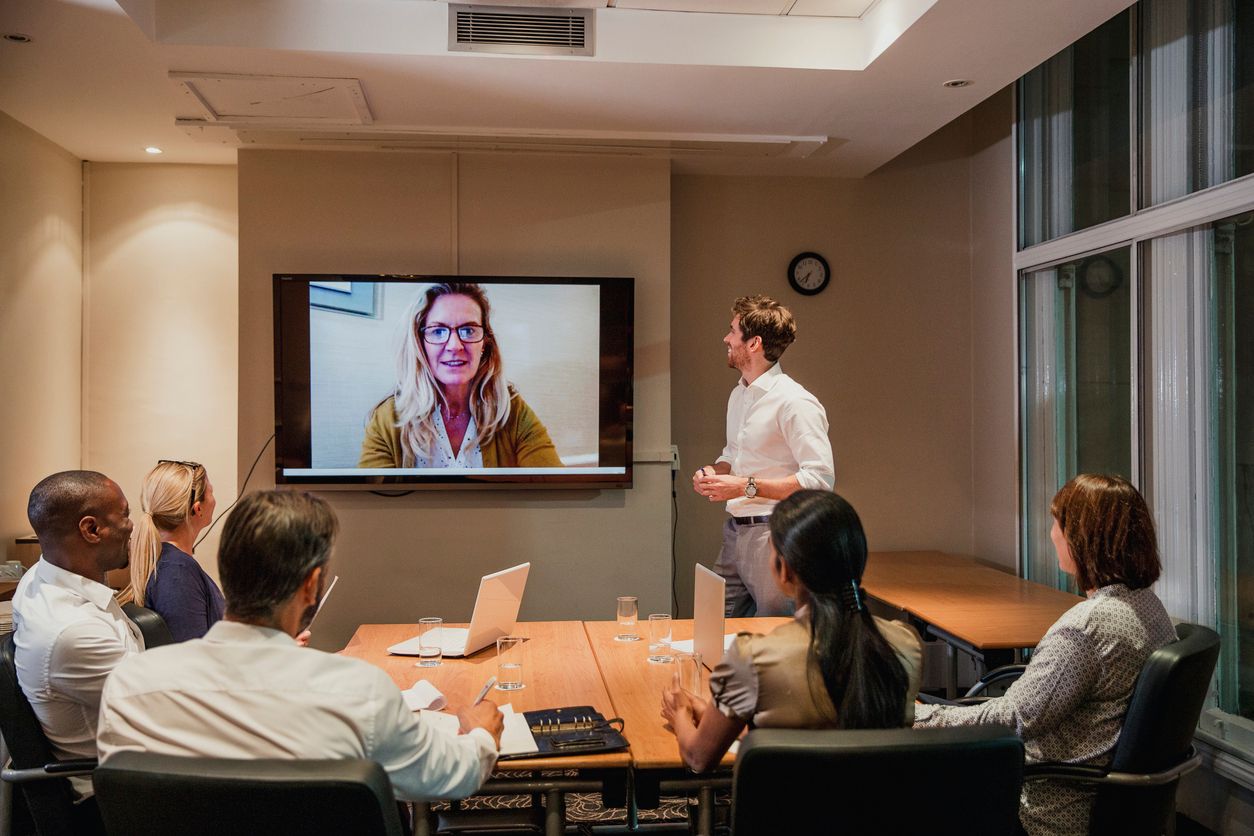When you've been in the hiring game for as long as we have, you hear every recruiting myth there is. From avoiding older candidates to holding out for perfection, the misconceptions about hiring just keep on popping up.
But, this misinformation can have a seriously negative effect on your selection process, and sometimes even your company itself. The hiring process can be enough of a struggle on its own without a whole host of unfounded misconceptions getting in the way.
So if you want to snatch up the best candidates, you shouldn't believe everything you hear on the recruiting grapevine. Here are the top 10 most common hiring myths debunked!
Myth #1 'You shouldn't disclose salary on job ads'
When it comes to writing an effective job advert, make sure you're including all the major specifics of the role. The average candidate only spends 14 seconds reading a job description, so you want them to see all the relevant information from the get-go to get them clicking that 'APPLY' button!
Posting the salary, or salary range, on your ad is a recruiting must for multiple reasons. For instance, it can act as a type of screening process, so that you don’t wind up with a whole host of applicants with wildly different salary expectations than you. More importantly, however, is that job ads with salaries often perform a hell of a lot better than those that don’t, attracting roughly 30% more applicants. And you can understand why. Applicants don't want to worry about whether or not they are applying to a role which is way out of their salary expectations.
Whilst there might be some business benefits to hiding the salary, it can throw a spanner in the works when you’re looking for employees. Best course of action is to be honest, or as honest as you can, with the candidates from the start to avoid any confusion or disagreements further down the line.

Myth #2 'An interview tells you all you need to know'
Recruiters and hiring managers put a lot of pressure and significance on the interview process. Rightfully so, it is pretty much the main event when it comes to the whole selection process. You read all about this candidate's experience and education through their CV, and perhaps you've even chatted with them for a bit over the phone or via email. But now they are sitting right in front of you and you have the chance to find out if they are the top talent you're looking for.
However, don't put all your recruiting eggs in one interview-shaped basket. A job search can be a pretty nerve-wracking period in someone's life, so we would always suggest taking how they come across during the interview with a pinch of salt. Many candidates are under a lot of stress and their anxiety may even get the better of them, meaning that the interview may not be a seamless event, even with the ideal candidate.
Instead of putting all the pressure on them to perform at their best during this stressful time, make an effort to help them feel at ease. Whilst being sociable and confident is a necessary skill set for some jobs, it isn’t essential for all of them. If you’ve got a great candidate who didn’t interview well, you can always offer them a paid trial period to see what they look like when they’re tackling the job at hand.
Of course, if the interview is terrible then it's probably not going to work out. Keep your eye out for these interview warning signs to make sure you don't wind up making a bad hire.
Myth #3 'The more experience, the better'
An impressive CV is always a plus when it comes to picking the right person for the job. However, an extensive work history shouldn't be your deciding factor.
It is a common misconception to think that a candidate's experience is their most important asset. Aside from the fact that around 78% of candidates lie about their abilities and experience during the recruiting process, it is often more valuable to hire based on an individual's potential.
When you're interviewing your applicants, ask the right interview questions and get to the root of what your candidates want from this position and what it is that they could personally bring to the role. You never know, you could wind up finding the ideal candidate in someone fresh out of university with no prior professional experience.
Plus, there are many added bonuses to selecting a candidate with limited work experience. For instance, people who are new to a working environment or sector are often easier to manage, as they have a fresher perspective on how to fulfil their duties.

Myth #4 'References don't matter'
Some things can be optional in the world of modern hiring, like cover letters or face-to-face interviews. But checking references is - and we can't stress this enough - one of the most constructive steps in the selection process.
You might think that an applicant has cherry picked their references in order to guarantee a positive recommendation, but that's not always the case. Whilst a candidate can embellish their CV and talk a big game in their interview, a former employer has nothing to lose in this situation and will therefore tell you the truth.
In fact, a study by CareerBuilder revealed that an overwhelming 69% of employers ended up changing their minds about a candidate after speaking to one of their references. Never underestimate just how much of an influence references have on the hiring process.
Myth #5 'You shouldn't hire older people'
Aside from being downright ageist, the myth that hiring old people can be detrimental to business doesn't actually have any empirical backing. In reality, regardless of the reasoning behind it, opting not to hire an individual based on their age is discriminatory.
Perhaps this myth stems from the idea that the younger workers will stay at a workplace for longer, as they are further away from retirement. However, studies show that millennials are actually the generation most inclined to be job hoppers, with six out of 10 of them admitting to being open to leaving their current employment for new work.
Of course, this doesn't mean you should stop hiring millennials either, particularly as younger generations who grew up with technology are definitely more likely to possess more up to date skillsets than their predecessors. But, it does suggest that having a healthy dose of age diversity in your workplace is a good thing.
Hiring staff from many generations can help improve your company culture, expand the skills and experience that your employees bring to their team, and bridge the growing digital gap. Overall, it’s a win-win for everybody!

Myth #6 'You want a candidate that fits into your company culture'
Company culture can be a bit of a delicate topic to discuss at the moment. Of course, the principle of hiring on a culture fit is great at face value, as it makes sense to recruit individuals who are going to fit in with your team and adhere to the values of your company.
But more times than not, hiring based on cultural fit can result in a lack of inclusivity. Think about it, who will fit in best with a team of young guys who like spending their Friday evenings together at the pub? Probably another young guy who enjoys a pint with the boys.
This kind of hiring doesn't just deprive your company of fresh, innovative perspectives, but it also drastically narrows your talent pipeline. A whopping 76% of job seekers claim that a diverse workforce is a major factor when accepting an interview or a job offer. For underrepresented groups, such as black or LGBT+ candidates, this plays an even bigger role.
Instead of hiring someone on a cultural fit, hire on a cultural add. Find candidates who are still 100% in line with your company values and goals, but who will bring new perspectives and identities to your team.
Myth #7 'Looking on a candidate's social media is immoral'
Social media snooping can be a pretty tricky topic in the recruitment industry. Some recruiters swear by it, others totally condemn it. But wherever you personally stand on this issue, there's no denying that researching a candidate via social media prior to hiring is becoming a continually more popular practice.
Around 70% of employers admit to using social networking platforms to look up potential candidates during the hiring process. Candidates only show a small - and very polished - portion of themselves during the application process, so viewing how they conduct themselves on their personal profiles gives employers a very good indication of whether or not they will be the right fit for a business.
But don't go scouring through years worth of social posts searching specifically for a reason NOT to hire them. Look for things that support their qualifications and stated skills as well. Perhaps they are using their Instagram as a type of portfolio or maybe they post a lot about the charity work they do. You never know.

Myth #8 'You don't need to follow up with unsuccessful candidates'
One of the more irksome recruitment myths refers to the idea that employers don't need to get back to applicants regarding any updates on the selection process.
Around 65% of candidates report that they rarely ever hear back from a business after going through the application process. But, not following up with your candidates is bad practice, and not just because it's rude and dismissive.
FREE DOWNLOAD - ULTIMATE HIRING CHEAT SHEET →
Of the 60% of job seekers who claim to have negative candidate experience, nearly all of them listed the lack of communication or follow ups from employers as their top complaint. It seems many hiring managers and employers seem to forget just how time-consuming an application process can be. We know what you might be thinking, 'well they didn't get the job, so why should we care about their experience with us?'.
Well, not communicating with your unsuccessful applicants is actually a waste of a reliable talent pool, as applicants who do receive notice from employers during the hiring process (even to be rejected) are 3.5x more likely to reapply to the same company in the future. Having an amicable connection with these individuals could save you tons of time and money when you're looking to fill another open position.
Myth #9 'Post an ad and let them come to you'
Advertising a role is the bread and butter of recruiting. It can work like a dream. But sometimes, in this difficult job market, if you’re looking for top talent to fill a tricky role, advertising alone might not cut it. You might even need to get your boots on and wade through the talent pool yourself.
Recruiting passive candidates via LinkedIn is one of the best methods for finding top talent in today's tumultuous job market. Now, if you don't know what a passive candidate is, it refers to those workers who are not actively looking for a new role, but are definitely susceptible to being head-hunted. These dormant prospective candidates make up roughly 73% of the current workforce.
So, next time you're hiring and you're having some difficulty finding candidates who have got the experience or qualifications you're searching for, have a look at candidates who are already in similar roles and connect with them. You can also use the LinkedIn Recruiter feature to help you identify and connect with individuals that you think would be the perfect fit for you business.

Myth #10 'The perfect candidate is out there'
The perfect candidate is like a unicorn; we've heard plenty of stories about them, but they just don't exist. So waiting for one to stumble across your job posting is a huge waste of your hiring efforts.
Very few candidates out there will match all of the essential requirements listed for the job you're advertising. So, by waiting out on the perfect candidate, all you'll end up doing is missing out on an enthusiastic and qualified one.
Instead of holding out for perfection, look for a motivated candidate with a passion for the role. Most importantly, look for a candidate who is eager to pick up new skills as they work. If you've got a solid onboarding process and a thorough training procedure, then it doesn't matter if your candidate is not familiar with a certain software or doesn't have years of experience in your given field. What matters most is that they are willing to put in the time and effort to become a top employee.
There we are - the top ten recruiting myths debunked. As you can see, many of them are built on stereotypes and generalisations of what a candidate's past or present has to say about them. But without genuinely getting to know your applicants or making the effort to figure out what their true motivations and goals are, you're never going to find that person who will fit in best with your company.
Hiring will always come with its challenges (lucky for you, we have a blog for that too!), so make sure you're not the reason why finding a new employee is so difficult. Keep an open mind and steer clear from silly myths, and you should be just fine.



![How to Hire a Remote Software Developer [ Step-by-Step Guide ]](/content/images/2022/04/iStock-1163541557.jpg)
![9 Zoom Interview Questions to Ask Software Engineers [ Recruiter´s Guide ]](/content/images/2022/04/iStock-1319790212.jpg)
![What is the Average Software Developer Salary? [ For Startups ]](/content/images/2022/03/iStock-1017296544.jpg)
